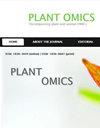Tissue-specific response of primary metabolites in tomato plants affected by different K nutrition status
Q3 Agricultural and Biological Sciences
引用次数: 3
Abstract
As one of the most important mineral nutrient elements, potassium (K) plays crucial roles in many fundamental processes, including enzyme activation, membrane transport, anion neutralization and osmo-regulation, and determines the yield and quality of crop production. In order to better understand and elucidate plant tissue-specific primary metabolic changes under different K nutrition status. Four-week-old tomato plants were subjected to different K nutrition situations: low (0.25 mM); normal (2.5 mM); and high (10.0 mM); and the emerging leaves, fully expanded leaves, petioles, stem and roots were harvested at 15 and 30 days, time points which the external symptoms are observed, after K treatments. Primary metabolites, amino acids, organic acids and sugars, extracted from each tomato tissue were measured with HPLC system. Several interesting findings from this study could be summarized as follows: (1) metabolites showed K-dependent responses, which indicated that the rates of an increase and decrease in low K-affected were 50 % : 50 % ;whereas, 80 % : 20 % in high K; (2) the petioles revealed the most sensitive plant tissue in response to K nutrition status; and (3) metabolites such as glucose and fructose (soluble sugars), malate and citrate (organic acids), and glutamine, asparagine, glutamate and aspartate (amino acids) strongly fluctuated (up or down) by the K nutrition ratio. These findings may contribute to a better understanding and elucidating the tissue-specific biosynthetic patterns and primary metabolite accumulation under different K nutrition ratios, and provide a new strategy for comprehensive information involved in the spatio-temporal metabolic networks不同钾营养状况对番茄初级代谢产物组织特异性反应的影响
钾作为最重要的矿物营养元素之一,在许多基本过程中发挥着至关重要的作用,包括酶激活、膜转运、阴离子中和和渗透调节,并决定着作物生产的产量和质量。为了更好地了解和阐明不同钾营养状态下植物组织特异性初级代谢的变化。4周龄的番茄植株受到不同的钾营养状况的影响:低(0.25mM);正常(2.5 mM);和高(10.0mM);在K处理后,在观察到外部症状的时间点15和30天收获新生叶、完全展开的叶、叶柄、茎和根。用高效液相色谱系统测定了从每个番茄组织中提取的主要代谢产物氨基酸、有机酸和糖。本研究的几个有趣发现可以总结如下:(1)代谢物表现出K依赖性反应,这表明低K影响的增加和减少率为50%:50%;高钾时为80%-20%;(2) 叶柄表现出对钾营养状况最敏感的植物组织;和(3)代谢产物如葡萄糖和果糖(可溶性糖)、苹果酸和柠檬酸盐(有机酸)以及谷氨酰胺、天冬酰胺、谷氨酸和天冬氨酸(氨基酸)因K营养比例而强烈波动(上升或下降)。这些发现可能有助于更好地理解和阐明不同K营养比例下的组织特异性生物合成模式和初级代谢产物积累,并为时空代谢网络中涉及的综合信息提供新的策略
本文章由计算机程序翻译,如有差异,请以英文原文为准。
求助全文
约1分钟内获得全文
求助全文
来源期刊

Plant Omics
生物-植物科学
CiteScore
1.30
自引率
0.00%
发文量
0
审稿时长
6 months
期刊介绍:
Plant OMICS is an international, peer-reviewed publication that gathers and disseminates fundamental and applied knowledge in almost all area of molecular plant and animal biology, particularly OMICS-es including:
Coverage extends to the most corners of plant and animal biology, including molecular biology, genetics, functional and non-functional molecular breeding and physiology, developmental biology, and new technologies such as vaccines. This journal also covers the combination of many areas of molecular plant and animal biology. Plant Omics is also exteremely interested in molecular aspects of stress biology in plants and animals, including molecular physiology.
 求助内容:
求助内容: 应助结果提醒方式:
应助结果提醒方式:


